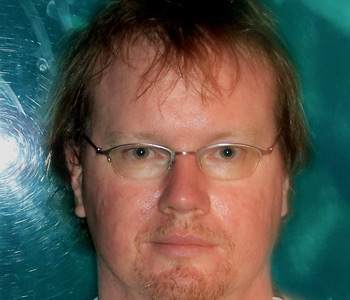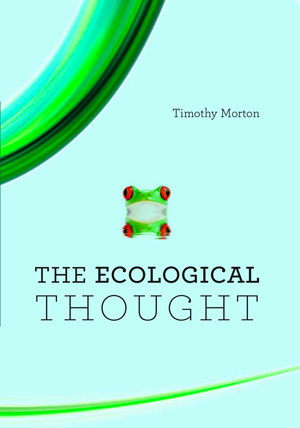
All life forms are interconnected. We share our DNA with chimps (98%) but also with daffodils (35%). We drive cars that burn crushed dinosaurs. The oxygen we breathe is the excretion of the most ancient bacteria. We humans hardly allow ourselves to know the half of this. We are even less clear on what it all means.
Global warming and mass extinction (the sixth one to hit this planet) are happening around us, and we are directly responsible for both. Humans are currently on a very, very steep learning curve about how interconnected everything is—about how our actions affect every other life form on this planet. It’s a very disorienting time.
With great crises comes great opportunity, and one great opportunity is to reflect, to hesitate, to stay stuck in the headlights of an oncoming train, open our minds, and think. The name of the oncoming train is the ecological thought.
We can only catch glimpses of the ecological thought from where we are. But its disturbing presence is all around us, like a shadow looming from the future over our time. Think of all those conversations you can’t have anymore about the weather with just any old stranger. One of you, at least, is thinking about global warming. So your conversation trails off into an awkward silence, or one of you brings it up. The familiar coordinates of our world are dissolving.
Before the opening snaps closed again and we find ourselves caught in another historical pattern, it would be good for us to see just how open the ecological thought can make us.
One disturbing conclusion we can already draw is that the concept “nature” has had its day and no longer serves us well. The main reason is that nature is a kind of backdrop—and we are living in a world where the backdrop has dissolved: it’s all in the foreground now. When we replace nature with the ecological thought, we discover a much stranger, more intimate, more jaw-dropping world.
“The concept “nature” has had its day and no longer serves us well. The main reason is that nature is a kind of backdrop—and we are living in a world where the backdrop has dissolved: it’s all in the foreground now.”
Since I was quite little I wanted to be a biologist; then I wanted to study ecology. I grew up in the UK and I saw David Attenborough’s Life on Earth series. I got the book—I must have been about ten years old. Somehow Harvard University Press telepathically echoed the little green tree frog on the cover for the cover of The Ecological Thought.
Ecology was the new progressive kid on the block in the 1970s and in semi-socialist London there was an amazing ecology exhibition at the Natural History Museum, which has since sold out to big oil. But in those days it was amazing. In another part of the Museum was the new human biology exhibit (still up and running pretty much in the same form), and the combination of intimacy and strangeness about these two new exciting exhibitions left a big impression on my mind.
During my university years (1989–1992) I started writing about vegetarianism and poetry—Percy Shelley mostly (Shelley and the Revolution in Taste). This was quite naturally an ecological theme. While I was doing it, “Romantic ecology” started happening: Jonathan Bate gave a very influential talk at a conference I went to and all of a sudden this new field opened up. I wasn’t quite sure how to relate to it, so I kept on thinking about food, which is ecological anyway. I wrote a book on spice (The Poetics of Spice), which argues that the first “global awareness” poetry wasn’t hippie-ish at all, it was sort of capitalist advertising language, kind of Archer Daniels Midland stuff you can find in Milton and all those early commercial capitalist era poets.
So I slowly started thinking about how to write about ecology, because I thought it was incredibly important but I didn’t buy into how people often write about it. It took a long time to figure out what I really wanted to say—about ten years. In the end I wrote Ecology without Nature in about five weeks! By that time I’d figured out what the title basically tells you: being ecological means, at some point, dropping the concept of nature. That book really surprised me, even while I was writing it.
Various people became quite interested in the idea of ecology without nature, and I realized that there was another book project, which explains what kind of thinking process is thinking ecology without nature—the ecological thought. So The Ecological Thought is the prequel, if you like, hopefully not in the Star Wars sense.
I poured everything I could think of into The Ecological Thought. A whole lot of it is about Darwin. The book uses Darwin’s original texts, plus a lot of neo-Darwinism, Richard Dawkins and so on. I thought it would be fun to have the most seemingly empiricist, reductionist, conservative and narrowly utilitarian (to some eyes) views, rubbing shoulders with the likes of Jacques Derrida, and basically saying the same thing. Most progressive-type writing on evolution doesn’t engage with that stuff or it slams it. I think you shouldn’t be afraid of it. Pretty sad how some humanists think that science is all about some kind of hardcore essence; in fact it’s quite the opposite.
I’m a deconstructor, sort of—at least I’ve been called one—so you’ll see Derrida’s spirit throughout this book. But honestly the book is written pretty much in the same style I’m using right now. There are no abstruse jargon filled parts—well there are, I can’t help it, but mostly they’re in the footnotes. The Ecological Thought is a lot easier to read than Ecology without Nature but I think it’s more profound. Derrida is a very moving writer, really. Once you get used to him, you see he’s writing about incredibly personal things, like death. And he’s so not a nihilist—don’t believe anyone who says he’s all about “nothing means anything.” He’s much more like Buckaroo Banzai, that 80s cult film hero: “Wherever you go, there you are.”
I’m also a meditator (Buckaroo again), and I believe that we need more contemplation on this planet. The immense suffering of life forms in the world we’re heating up (one of those life forms is us) should cause anyone with a nervous system to reflect quite seriously on what it all means. Meditation doesn’t mean disappearing up your metaphysical backside into some realm of bliss. It means becoming painfully aware of your entanglement with all other life forms, an entanglement you can’t just peel away from your existence: you’ve got them under your skin—they are your skin. Think of your mitochondria, the energy cells within your cells. They’re bacteria with their own genome, symbiotically wedded to you. Plants are green because of chloroplasts, another form of symbiotic bacterial life.
There’s a lot of art and literature and music in the book. I’m trained as a literary analyst, so obviously art gets in. But I also agree with Shelley that art has a utopian energy in it, and it’s our job to find out what that is and experience it, maybe harness it. So at points where the philosophy needs it, some of the thinking is done through music and poems and movies, like Blade Runner, Solaris, AI and so on.
Kim Stanley Robinson’s Mars trilogy is in it. Wordsworth is in it. The Romantics figured a lot of things out, but not quite in the way that “Romantic ecology” thinks. Funnily enough, it’s the Romantics’ love of irony that I see as most helpful for the ecological thought, not their supposed fondness for big mountains. Remember, if we’re all intimate with all other life forms, there’s a lot of strangeness there. Think about your long-term partner if you have one. When you wake up next to him or her, doesn’t s/he seem like the strangest person in the world? (Paging Freud…)
If I were yelling at someone from a fast moving train and had only one chance to say one thing about my book before they went out of earshot, I suppose it would be the stuff at the end. The concepts that lead up to this point are interesting, of course—“the mesh,” which is what I call ecological entanglement, and the “strange stranger,” which is how I think about life forms.
But the real juice of the book would have to be the writing about how important it is to create a politics and an ethics based on non-self.
We modern humans have given rise to the most terrifying things like global warming and plutonium—I call them hyperobjects. These monsters massively outlive us and vastly extend beyond our personal backyard to encircle the entire Earth. There is no way you can think of them without your mind opening up. Plutonium has a half-life of 24,100 years. That means we have a 24,100-year responsibility to the future. However you think of it, everyone, anyone you meaningfully care about as connected to so-called “you” will be long gone by then—will there even be humans? Twenty-four thousand years is twice as long as all of recorded human history thus far.
Likewise global warming is mind-bending. Unlike snow, you can’t see it or touch it; this gives global warming deniers a foot in the door. But the kicker is, it’s much more real, in a very precise sense, than a snow shower. It’s the snowfall that becomes the abstraction! Weather is an abstract subset of climate. It’s just what you think you can feel falling on your head in a certain time at a certain place. This is why the fiercest battles are fought over global warming right now. Right wingers know that if they give this idea a sliver of a chance, they literally don’t have a leg to stand on. Because reality isn’t hardwired their way. It’s a whole, dynamic process in which we are all implicated and for which we all have responsibility. Who cares whether we caused global warming or not? If you can understand what it is, you have a responsibility to fix it. It’s like seeing a small girl about to be hit by a truck. Saying “Well she’s not my daughter, why should I care?” would clearly be wrong. You just jump into the street and save her.
“It’s the Romantics’ love of irony that I see as most helpful for the ecological thought, not their supposed fondness for big mountains. Remember, if we’re all intimate with all other life forms, there’s a lot of strangeness there. Think about your long-term partner if you have one. When you wake up next to him or her, doesn’t s/he seem like the strangest person in the world?”
We urgently need to formulate reasons for doing things that aren’t based on concepts of self, because even if we modify those concepts to include as many others as possible, we’ll always leave someone out. And gamma rays don’t leave anyone out—hyperobjects are pretty inclusive beasts. Our philosophy has to be at least as inclusive as they are to stand a chance of dealing with them.
I think the whole project of The Ecological Thought itself is a kind of “lastly” type of a project. If you don’t think that there’s something very wrong with Earth and with our ways of thinking about our place on Earth, then—well you just proved that there is truly something wrong!


Timothy Morton is Professor of English (Literature and the Environment) at the University of California, Davis. He is the author of nine books and over sixty essays on ecology, philosophy, culture, literature, and food. He writes at ecologywithoutnature and contemporarycondition.